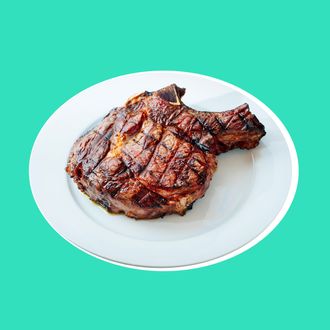
The first time I tried eating almost no carbs was when I was 20 and trying to follow a strict “anti-inflammation” diet that I’d found online (the internet was a different place in 2003 — actually, I guess it was exactly the same). The diet promised to help me with the skin problems I’d been having, and I bought into it completely. It advised eating as few carbohydrates as possible, which felt at the moment like a light-bulb epiphany — at the time I ate mostly cereal, and the dramatic conversion is I think what made it all feel so exciting and promising.
I adhered to the low-carb regimen with an almost religious conviction for the next six months or so, fully expecting my skin (and, of course, by extension, my entire life) to transform, though it stayed mostly the same. An unintended result of eating that way, though, was that I quickly lost 15 pounds and entered what I now imagine was ketosis.
Ketosis is the fuel-burning process your body activates a few days after you stop feeding it carbohydrates. As the body switches from burning glucose to ketones (which are molecules produced in the liver when glucose isn’t available), people often report feeling dizzy, nauseous, irritable, and fatigued. This general feeling of dragging is commonly called the keto “flu.”
Most ketosis proponents say that this adjustment phase (or “flu”) eventually wears off, although in a piece about the keto diet for Tonic, Grant Stoddard writes that for him it didn’t, exactly: “If and when you get through an often uncomfortable adaptation period,” he writes, “you may still find that you don’t have as much gas in the tank when performing any type of physical activity.”
For what it’s worth, I remember once during my own keto diet feeling almost too tired to finish going up the flight of stairs to my room. I also experienced another common keto downside, which is the signature bad breath that can accompany such low-carbohydrate diets. As your body releases ketones, your breath can take on an odor/flavor I’ve seen described as “metallic,” “fruity-smelling,” and “similar to nail polish remover”. I didn’t know that’s what was happening at the time, and I remember finding the smell kind of satisfying, somehow, as well as disgusting. It seemed like evidence of whatever mysterious biological process was going on inside me. I also felt young and invincible, and the fact that I was so tired seemed almost funny.
I understand the appeal of diets like these. It’s fun to make dramatic changes to yourself — it feels like pushing a reset button on your entire life. Such diets are also the ultimate distraction. Or, as Stoddard says, “It felt, at times, like a full-time job.”




